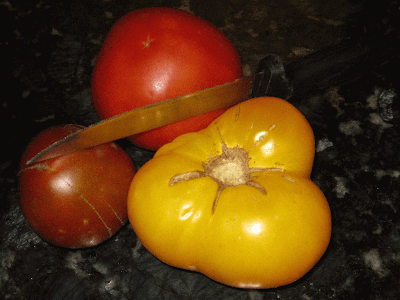 I always look forward to June because that's when Jim's tomato crop comes in. He grows heirloom varieties and brings what he can't use to the office to give away. He knows I appreciate a good tomato, so he always lets me know before he puts them out for general consumption. I think he wants the folks that will enjoy them most to have first dibs.
I always look forward to June because that's when Jim's tomato crop comes in. He grows heirloom varieties and brings what he can't use to the office to give away. He knows I appreciate a good tomato, so he always lets me know before he puts them out for general consumption. I think he wants the folks that will enjoy them most to have first dibs.My grandparents were produce wholesalers whose business was built on tomatoes. The ones they got in the summer were the best: locally grown with a bright flavor and meaty texture that one can't find from the "shipped-in" ones they got in the winter. In the off-season, they came mostly from Florida and were in no way comparable to the "home-grown" they got in the summer.
During the summer, it was impossible to leave their house without a bag of them. The blemished ones, the ones they couldn't sell. They gave them away to anyone and everyone who stopped by. And the "damaged goods" tasted just as good as the perfect ones. They just weren't as pretty.
Canned tomatoes are generally better in the off-season than what you can buy "fresh" because they are bred and grown to be canned, not shipped. Unless harvested locally, the ones you see in the grocery were probably grown hundreds of miles away and shipped by trailer or train (or both) to your grocery store still half green. Tomatoes bruise very easily, and one bruise can cause many others around it to rot. They have to be culled daily. It's a lot of manpower.
To get around that, growers bred varieties that travel better, but at the expense of flavor. That's why the tomatoes that look so good at the store end up being a pulpy, mealy, tasteless filler. They don't bruise as bad, but they have no taste. They're a waste of time and money, as far as I'm concerned. And the ones that are worth eating that have had special handling cost a small fortune.
Canning tomatoes, on the other hand, don't have the restrictions or cost of "fresh" tomatoes. As long as they're not rotten, whether they look pretty or not is of no consequence. They generally don't have to be shipped too far from the cannery, because it's cheaper to acquire them locally than to buy them from 750 or 1,000 miles away and hope they get there in reasonable condition.
My family never had a lot of money, but I grew up with a privileged life. I had good, fresh food that tasted like the sun that had nurtured it.
In addition to tomatoes, we had fresh cantaloupes, watermelons, green beans, corn (white and yellow), purple hull peas, okra, squash and just about anything else that was in season.
Good, fresh food is to be cherished for the short time it's in season. The season will end all too soon, and then it's back to the cans and the freezer section.
No comments:
Post a Comment